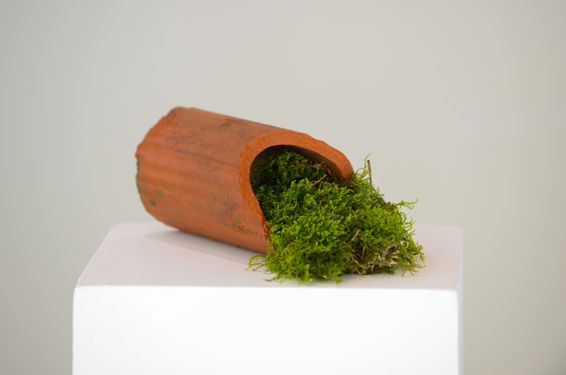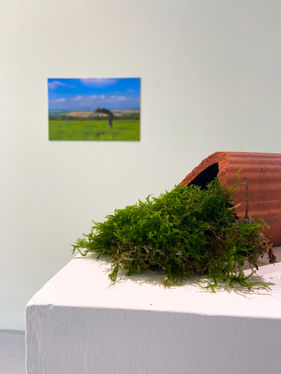
Research
Change Lab
"Change Lab is a critical, immersive space for exploring how your practice as an artist/ designer is inherently pedagogical"
- King & Murphy
The Change Lab situated in NCAD's Gallery, is a creative space where students on the Professional Masters of Education combine their artist, educator, researcher and activitist identities to investigate Development Education themes. Place and space were the key concepts investigated under the theme 'Moment in Time'. In groups of three or four we took influence from each other's artist/designer practices and perspectives on social justice issues. Communities of Practice, Narrative Inquiry and Arts-Based Research are the three theoretical frameworks we engaged.
Our group was composed of three women who live in rural Ireland. Each of us came from different designer/artist backgrounds. Beth Toner is a Graphic Designer, Mags Brennan is a Fine Art Painter and I am a Visual Artist. We investigated The United Nations Sustainable Development goal 5 gender equality and goal 15 through a series go ecofeminist interventions. "Ecofeminism is a branch of feminism that sees environmentalism, and the relationship between women and the earth, as foundational to its analysis and practice" (Zein, Setiawan, 2017). We merged our artist, researcher and educator identities together and questioned how we can help create a more equal and sustainable world.

Our Change Lab Interventions
See. Appreciate. Change.

The artistic process we followed was See, Appreciate, Change. We recognised the women of the past, celebrated their achievements and how they worked the land. Becoming Ecofeminists starts with changing our approach to the land practice to a more sustainable approach, appreciating the land as a gift not a possession. Through varies creative and sustainable interventions we re-established ourselves in our landscape and sought a different dialogue. Using the land as our medium, our resource and ecofeminism, the lens through which we engendered our work.
In Wexford, I created a relationship with the space, by engaging in a dialogue between my female body and an agricultural landscape. By taking off my shoes, to feel the grass in between my toes, to harvesting soil to paint with and filming how I interact with the open scenery.
Beth, located in Louth focused on alternative and sustainable forms of printing and producing images. She eco-dyed recycled fabrics in the river that runs through her family's farm, producing chlorophyll and anthotypes prints. Using the natural pigments from flowers she extracted and the river water she created vibrant panels of colour.
In Kildare, Mags created an embroidery drawing on white fabric and constructed temporary shelters within her local forest.
Will you walk with us?
An Ecofeminsit approach to sustainable land practices.
See. Appreciate. Change.
An exploration of our relationship with the land we inhabit as women, legacy and inheritance were the heart of our response to the Change Lab.
“Every new day we question each system we have known since birth,
and are obliged to consider their possible demise”
- Li Edelkoort.
Globally, only 13.8% of landholders are female. In Ireland, only 12% are female. As a group we imagined what the world would look like if women had a more active role in land practices, if traditional ecological knowledge was recognised by dominant culture as holding equal value as empirical knowledge.
Ecofeminism highlights the parallels between the exploitation of women and the exploitation of land, by addressing the Sustainable Development Goals; Goal 15, Life on Land and Goal 5, Gender Equality. Through various creative and sustainable interventions we re-established ourselves in our landscapes and sought a different dialogue. Using the land as our medium, our resource and ecofeminism, the lense through which we engendered our work.
Through this unpredictable time, we moved away from the traditional gallery setting and into the digital realm. We used social media (instagram) as an evolving space, a way of co-curating with the audience and creating a platform dedicated to research and discussion.
As artist researchers we are committed to steering our creativity towards the advancement of a just and sustainable world.
See, appreciate, change.

Video documentation of the Change Lab Installation
Change Lab Exhibition Installation
Will you walk with?
3 women, 3 locations
Photographs























